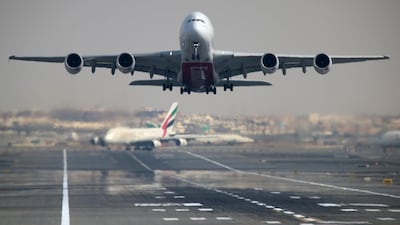Dubai issued a new law that gives the Dubai Civil Aviation Authority more autonomy in co-ordination with the UAE's General Civil Aviation Authority.
The law is aimed at consolidating Dubai's global leadership in the civil aviation sector, as well as enhancing the emirate's attractiveness as a destination for aviation businesses, the Dubai Media Office said on Saturday. It will also boost safety, security and sustainability in the sector.
Under the new law, the DCAA will formulate general aviation policies and carry out activities related to civil aviation operations in accordance with federal legislation and international agreements.
"In addition, DCAA will propose legislations related to civil aviation and participate in all quality control activities conducted by international and federal entities including inspection and testing," the Dubai government said.
"Under the new law, DCAA is authorised to sign agreements ... related to air traffic rights to operate via Dubai airports, and implement them in co-ordination with the General Civil Aviation Authority," it added. "The DCAA is also responsible for permitting operators and those holding licences issued by the GCAA to operate scheduled and chartered flights to Dubai."
The law will also see the DCAA represent Dubai in local and international civil aviation matters, such as negotiations related to air traffic rights, air space, and air navigation, and the investigation of disasters, accidents and emergencies.
Under the previous law, the DCAA was required to seek approval from the GCAA, as well as report Dubai's air traffic data to the federal regulatory body.
In 2019, Dubai International Airport handled 86.4 million passengers, making it the sixth year in a row that it was ranked as the world's busiest for international passengers.
However, the Covid-19 pandemic has hit the global aviation industry hard as borders closed temporarily earlier this year to contain the virus.
According to the International Air Transport Association (Iata), demand for air travel has remained weak despite the breakthroughs on Covid-19 vaccines.
Air travel demand in most international markets is expected to remain "exceptionally weak and [are showing] very little recovery with quarantines in place", Brian Pearce, chief economist at Iata, said during a media briefing last week.


